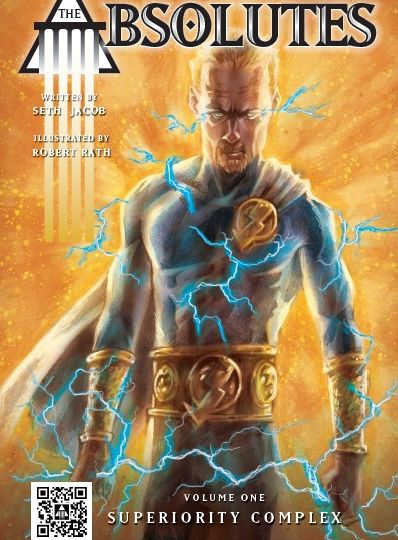
Full Disclosure: Writer Seth Jacob is a fellow contributor here at Comic Booked.
Though they don’t break ground that hasn’t been dug through by The Authority, Seth Jacob and Robert Rath do offer a scathing view of the cape comic and the Big Two’s attempts to trump up its relevancy in their comic book The Absolutes. As Superman analog (and Simon Pegg-lookalike) Mr. Jupiter pontificates, “Why do we allow crimes against humanity to persist while we fight endless battles…?” before declaring that his team, the Absolutes, are now going to start dealing with that very sort of thing. Too often, and this is especially true over at Marvel, the hyperbole about how their heroes are “in the world outside your window” is only used for convenient publicity for the latest super-fight event, while the characters rarely address social issues beyond the vague or the abstract, not even willing to engage in metaphor and allegory; this is why Reed Richards is able to conjure up various gizmos to defeat Dr. Doom for the billionth time while curing cancer seems beyond this polymath genius, unless the patient has any sort of marketing potential in relation to the Fantastic Four (and I mean any), but I digress. Here, Jacob and Rath back up the hype with action as their superteam’s first official act in defiance of the world’s governments does what they’ve promised for decades to do, which sets the tone of destructive do-gooders speaking revolution against cynical (but relatively safe) rulers. Instead of fleeing from what “the world outside your window” means, their heroes decide to take it head-on because they can, but like all classic sci-fi, the question is posed of whether they should.
 A large chunk of the issue is exposition, including multiple pages of set up that explain exactly who each team member is and just how much you don’t want to mess with them. Not the most exciting way of handling a debut, especially since the inciting moment (the Absolutes taking down an American invasion force in Iran) happens off-page, but Rath gives those first few pages the info-overload quality of the Internet: panels are overlaid atop government symbols, like watching video on a web site, while Mr. Jupiter’s explanation of the villains he’s fought in the past reads like someone is watching “videos” in conjunction with this one (one image of Jupiter pulling on Osama bin Laden’s beard when talking about how quickly the Absolutes could have caught him recreates the often-humorous use of Photoshop online). Later, when the Absolutes strike, it’s “streamed” onto their website. It’s a surprising, modern quirk drawn in a rough style, which makes an otherwise unremarkable series of pages pop.
A large chunk of the issue is exposition, including multiple pages of set up that explain exactly who each team member is and just how much you don’t want to mess with them. Not the most exciting way of handling a debut, especially since the inciting moment (the Absolutes taking down an American invasion force in Iran) happens off-page, but Rath gives those first few pages the info-overload quality of the Internet: panels are overlaid atop government symbols, like watching video on a web site, while Mr. Jupiter’s explanation of the villains he’s fought in the past reads like someone is watching “videos” in conjunction with this one (one image of Jupiter pulling on Osama bin Laden’s beard when talking about how quickly the Absolutes could have caught him recreates the often-humorous use of Photoshop online). Later, when the Absolutes strike, it’s “streamed” onto their website. It’s a surprising, modern quirk drawn in a rough style, which makes an otherwise unremarkable series of pages pop.
 The other thing Absolutes does well is not pull punches in regards to its targets. Mr. Jupiter, decked out in lightning insignias like he really is going to start hurling bolts at any that defy him, specifically serves as a mouthpiece against American foreign policy. Despite their objections to the contrary, Republicans and Democrats hew closer to each other than supporters and hacks give them credit for, especially in regards to the War on Terror, and Jacob and Rath’s use of Barack Obama instead of a convenient proxy highlights this. Couple this and the internet motif with Jupiter’s backup – black ops ubermensch Private Might (Judge Dredd as done by Liefeld and Millar), ethnic wonder woman Madam Meta, Halloween freak the Great Clout, and spiritual/technological progressives Nirvana and Hypersonic – and the team suggests a Mt. Olympus for the Twitter/Occupy generation, concerned less with political squabbling and more with making their statement heard at all costs. This inverts Morrison and Porter’s JLA, which cast the DC pantheon as aloof and beyond the problems of us mere mortals, but creates the same disquieting effect that these “metahumans” are beyond us. Appropriate that doubt creeps in from the “regular policewoman”-turned-super-being Madam Meta (an ex-lover to Jupiter, a serendipitous choice given recent news) when she says the team’s actions “may be too extreme,” and ominous warnings like the tagline “We are the Absolutes. We are watching you. Try to play nice” suggesting benevolent fascism is in the works with such an unwavering, moralist resolve. Placing such a line at the end, atop Mr. Jupiter’s face aglow with lightning, smartly gives what is otherwise a triumphant moment for the Absolutes a chilling undercurrent. More than anything else in the comic, that image sticks.
The other thing Absolutes does well is not pull punches in regards to its targets. Mr. Jupiter, decked out in lightning insignias like he really is going to start hurling bolts at any that defy him, specifically serves as a mouthpiece against American foreign policy. Despite their objections to the contrary, Republicans and Democrats hew closer to each other than supporters and hacks give them credit for, especially in regards to the War on Terror, and Jacob and Rath’s use of Barack Obama instead of a convenient proxy highlights this. Couple this and the internet motif with Jupiter’s backup – black ops ubermensch Private Might (Judge Dredd as done by Liefeld and Millar), ethnic wonder woman Madam Meta, Halloween freak the Great Clout, and spiritual/technological progressives Nirvana and Hypersonic – and the team suggests a Mt. Olympus for the Twitter/Occupy generation, concerned less with political squabbling and more with making their statement heard at all costs. This inverts Morrison and Porter’s JLA, which cast the DC pantheon as aloof and beyond the problems of us mere mortals, but creates the same disquieting effect that these “metahumans” are beyond us. Appropriate that doubt creeps in from the “regular policewoman”-turned-super-being Madam Meta (an ex-lover to Jupiter, a serendipitous choice given recent news) when she says the team’s actions “may be too extreme,” and ominous warnings like the tagline “We are the Absolutes. We are watching you. Try to play nice” suggesting benevolent fascism is in the works with such an unwavering, moralist resolve. Placing such a line at the end, atop Mr. Jupiter’s face aglow with lightning, smartly gives what is otherwise a triumphant moment for the Absolutes a chilling undercurrent. More than anything else in the comic, that image sticks.












